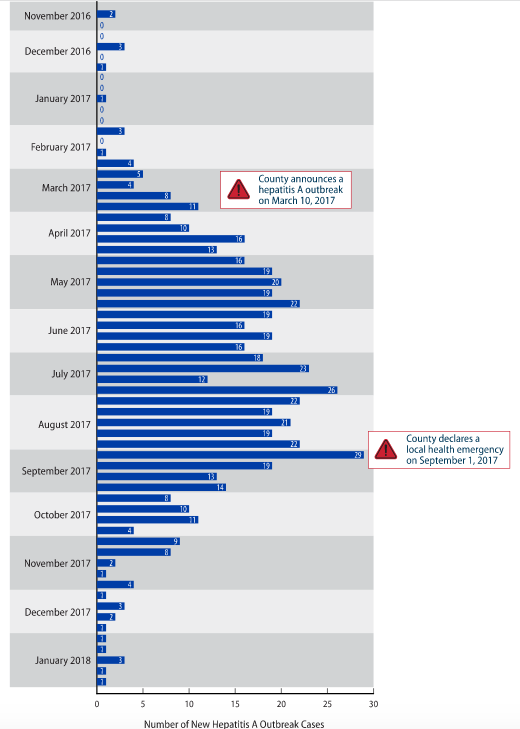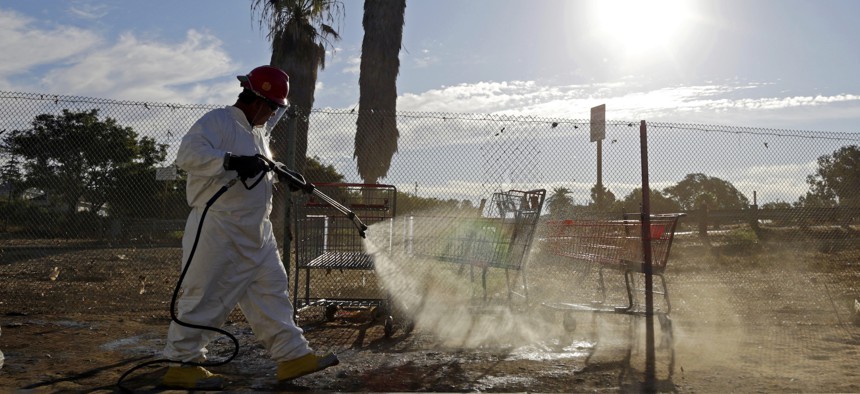Connecting state and local government leaders
A California state auditor’s report focuses much attention on a slow public health response as the highly-contagious liver disease spread.
The California State Auditor released a report on Thursday examining the local government response to San Diego’s massive hepatitis A outbreak last year, offering some important insights into county and city decision making amid a growing and serious public health emergency.
The good news, according to the audit’s summary of results: Shortly after San Diego County’s Health and Human Services Agency detected the increase in reported Hepatitis A cases in March 2017, “it took steps to understand the outbreak, determine the necessary interventions to contain it, and identify the characteristics and size of the at‑risk populations.”
The bad news for the county: “However, its failure to adequately plan and quickly implement certain aspects of its response led to unnecessary delays in its execution of critical actions.” That meant that the county was slow to “mitigate the risk” that members of two at-risk populations—individuals experiencing homelessness and those using illegal drugs—might become infected and spread the highly contagious liver disease to others.
By the end of the outbreak, 584 cases of hepatitis A had been detected. Twenty people died and nearly 400 were hospitalized. National news attention on San Diego during the crisis included images of public works crews power-washing sidewalks with bleach.
Paging through the auditor’s report, which was requested by California State Assemblymember Todd Gloria, there are some important takeaways not just for public health professionals, but other local government decision makers who can end up making a situation worse by not moving quickly enough—the word “slow” was mentioned numerous times.

That includes the importance of having enough public restroom facilities and hand-washing stations available to unsheltered individuals living on the streets. (“Neither the county nor the city promptly implemented measures to improve sanitation and hygiene conditions for the at-risk populations in the city, even though adequate sanitation is critical to controlling the spread of the disease,” according to the audit highlights.)

Another key point is the importance of accelerating vaccination efforts when an outbreak is detected. The audit found that if San Diego County had acted sooner to administer hepatitis A vaccines to at-risk populations, the outbreak may have eased sooner. (“More vaccinations were administered in September than in the previous six months combined. This increase in vaccinations coincided with a dramatic decline in the number of new hepatitis A cases,” according to an audit highlight.)
There were also major shortcomings in intergovernmental communications between the county and the city. The county did not “promptly” share location incident data to inform the city about the concentration of cases within its jurisdiction until November 2017, according to the audit.
At the time of the outbreak, the county also lacked a policy group with regional representatives that would have, if it had been in place, “enabled the county to more promptly and efficiently facilitate coordination with the relevant jurisdictions,” in this case the city of San Diego.
A local public health emergency was declared in San Diego County on Sept. 1, 2017, nearly six months after the outbreak was initially detected. The auditor’s report details some of the haze of intergovernmental decision making and information sharing as the public health emergency was worsening throughout 2017:
In the absence of such a group, the city’s assistant chief operating officer stated that the county did not give the city a reason to believe the outbreak was a serious issue until the county health officer issued her directive on August 31, 2017, nearly six months after the county had detected the outbreak. Additionally, the county did not share location data to inform the city about the concentration of the cases within its jurisdiction until November 2017. If the city had had more information, it might have more quickly understood the need for the sanitation measures. In its Hepatitis A Outbreak After Action Report ... the county noted its lack of a policy group of county and regional executive leaders, and it acknowledged that regularly convening a policy group that included leadership from impacted jurisdictions would have been appropriate for the outbreak response.
Because the county did not do enough to inform and involve the city, the city lacked information that would have enabled it to understand the severity of the outbreak and the need to implement sanitation measures. State law requires the governing bodies of cities to protect the public health of their residents, which the city does in part by contracting with the county to address specified public health matters within the city. Nonetheless, we expected the city to have taken some additional steps to understand the actions needed related to sanitation to protect the public health of the at‑risk populations, such as requesting updates from the county regarding the response and coordinating any of its own sanitation efforts with the county. However, according to the assistant chief operating officer, the city expected the county to manage the outbreak and provide the city direction on what was required or necessary. Based on discussions it had with the county, the city believed that it was adequately responding to the county’s requests; thus, it did not see a need at the time to take additional action.
Both the city and county were allowed to officially respond to the audit before it was released and their responses were included in the report.
The county’s response, written by San Diego County Health and Human Services Agency Director Nick Macchione, notes that the state’s audit findings “generally align” with what the county already concluded in Hepatitis A After Action Report released in May. “As you have learned through this audit, this hepatitis A outbreak was unparalleled. With no previously established response playbook for this type of outbreak, a virus with an incubation rate of 50 days, and an extremely difficult to reach affected population, the County’s response required innovation and agility.”
Macchione noted that the county’s response to an unprecedented outbreak, which included vaccination “foot teams” trying to reach hard-to-serve at-risk individuals, did receive praise from the California Department of Public Health and U.S. Centers for Disease Control and Prevention.
Responding to the state auditor’s critique of a slow county response, Macchione wrote: “While there are areas in which we could have acted more quickly, success is not purely measured by the speed of response but also the effectiveness of the actions taken.”
State Auditor Elaine Howle offered a point-by-point rebuttal to Macchione’s response, noting that much of her criticism of the county wasn’t on the techniques of its public health response, but its speed. “Our concern regarding hand-washing stations was the length of time it took to deploy them,” noting that was four months after the county had initially identified them as a preventative countermeasure.
The city’s official response to the audit was brief, with Chief Operating Officer Kris Mitchell writing that the city accepts the two recommendations and is working to implement them: having a new memorandum of understanding with the county that clarifies “each entity’s roles and responsibilities over public health matters,” and identify and address “any unresolved issues that may have contributed to delays in implementing sanitation measures” before the official public health emergency declaration.
With hepatitis A cases continuing to surge in different parts of the nation, including Arizona, Kentucky, New York, Ohio and West Virginia, learning the lessons of what happened—and didn’t happen—in San Diego is even more important.
Michael Grass is Executive Editor of Route Fifty and is based in Seattle.

NEXT STORY: Could a Supreme Court Decision Entitle 2,000 Oklahoma Inmates to New Trials?




